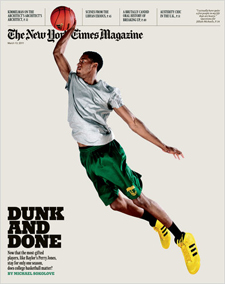Baylor continues to stand up for fairness in case of Perry Jones
 With Baylor’s men’s basketball team getting passed over for postseason play on Sunday, it would be easy to say there’s no need for urgency left in Baylor’s appeal to the NCAA involving the seeming inconsistencies surrounding Perry Jones’ suspension last week.
With Baylor’s men’s basketball team getting passed over for postseason play on Sunday, it would be easy to say there’s no need for urgency left in Baylor’s appeal to the NCAA involving the seeming inconsistencies surrounding Perry Jones’ suspension last week.
But that’s not the approach the university is taking, and I’m glad for that. Sure, Baylor would have loved to have had its appeal heard by the NCAA before postseason decisions were made. But this is about more than just a team playing a few more games. It’s about the injustices suffered by a bunch of innocent members of the Baylor family, Jones’ teammates, and one young man in particular: Perry Jones III.
I hope that you’ll take a minute to read the excellent cover story on PJ3 from this weekend’s New York Times Magazine. Author Michael Sokolove provides an incredibly in-depth look at Jones and his family with insight gained from spending a great deal of time around the Joneses and Baylor over the past several months. Sokolove describes Jones as “a sweet kid” with “a shy smile, a sweet nature and the manners of a young man who has attended church almost every Sunday of his life.” Baylor Magazine called him “The quiet giant” in its story in December, and that title seems fitting.
The situation comes down to this: Here we have a young man, one of our own here at Baylor, who has been treated unfairly by the NCAA and in a manner inconsistent with the organization’s own recent decisions in similar cases. (That’s not just my conclusion; plenty of others around the country have made the same case.) Baylor administrators continue to push for a hearing on their appeal, and the latest word says that the hearing may finally take place later this week.
As I wrote last week, I’m grateful for all who have stood up for Baylor and Jones in particular, from members of the media (see the NYT, Yahoo! Sports and the Pittsburgh Tribune-Review, just for example) to members of Baylor Nation, who have expressed their frustration in a wide variety of ways, up to and including writing the NCAA. Given the NCAA’s self-described purpose of “govern[ing] competition in a fair, safe, equitable and sportsmanlike manner,” I’m hopeful that the appeal will lead to a man’s reputation not being further tarnished.
Sic ’em, Baylor family!

